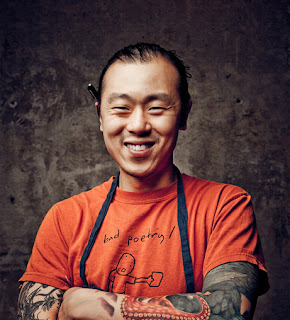Interview with David Gunawan, Executive Chef of Farmer’s Apprentice
-->
The following interview was made possible by the NW
Tastemaker, a culinary travel publication forthcoming from Northwest Travel
Magazine. To read more interviews with the best chefs in the Pacific Northwest,
visit Northwest Travel Magazine and
TableTalkNorthwest.com.
 |
| Photo by Carlo Ricci |
David Gunawan, Executive Chef of Farmer’s Apprentice
The
name says it all. Opened in 2013, Farmer's Apprentice almost exclusively uses
hyper-local ingredients, and Chef David Gunawan is inspiring diners and
colleagues alike with his dedication to supporting local farms and farmlands.
It
takes an environmentalist's appreciation of agriculture to understand how Chef
Gunawan's version of farm-to-table dining is unique. It's the little things.
For instance, he features meat from heritage breeds of pig to offer diners
compelling flavors, and in so doing, he is simultaneously championing
non-industrial pig breeds for future generations of chefs. These breeds of pig
cost more, but surprisingly, Farmer's Apprentice is able to maintain mid-range
prices for diners. Chef Gunawan would rather buy whole pigs and butcher them
in-house than buy lesser breeds to reduce costs. Farmer's Apprentice is
dedicated to sustainability and flavor over cutting corners. Before opening
Farmer's Apprentice, Chef Gunawan cooked at In De Wulf in Belgium (one Michelin
star); West; and Wildebeest.
1. How do you describe Northwest cuisine?
I
think Northwest cuisine is broad. Northern California, Portland, Seattle and
Vancouver each have their own identity. As a whole, we Vancouverites aren’t as
strong in the farmer-chef relationship. We see a much stronger bond in
Portland, and the unity of trust between farmer and chef down south is far more
dedicated to the farm-to-table movement.
The
Vancouver market is dictated by financial incentive for obvious reasons. The
Portland style of restaurant is more based on austerity. The city also boasts a
very dynamic subversive counter culture. Portland is an ecologically aware
city. Sustainable farm-to-table cuisine is almost expected. The city boasts the
most college-educated populous in the entire nation.
Seattle
is guided by the standard of a large metropolis. It is a little more diverse
than Portland, and there are a few lavish establishments to cater to the
growing tech industry. It has a stronger Japanese influence than Portland. The
food is still very much market-driven, as most cities are in the Northwest.
Seattle is a very left wing city, and again, they also have a very strong chef
and farmer relationship.
Vancouver
is unique due to its ethnic diversity, especially the historical contributions
made by Chinese and Japanese immigrants. As a small city, we seem to support an
exorbitant amount of chain restaurants, and this makes it very difficult for an
aspiring small-business owner to start a venture without a lot of capital.
Hence, Vancouver cuisine is very safe, ubiquitous and predictable. We are
less subversive. We have amazing Asian restaurants that are comparable in
quality to those in Hong Kong, China, India and the like, but drawing from so
many cultures has created a Vancouver menu that I think is confused in some
ways. We have no adherence to one culture but, rather, many cultures.
2. Who are six of your favorite purveyors that
you regularly work with?
Solefood,
for the quality of produce as well as its community initiatives.
Foxglove
Farm— Michael Ableman is the pioneer of urban agriculture and also an author
and a teacher in ecology. His produce is phenomenal. It is grown with
intelligent care and intention.
Stein
Mountain Farm Oreganics and Sapo Bravo Organics in Lytton, for all around solid
produce grown with love and respect.
Outlandish
Shellfish— They have amazing shellfish selections
Wu
Wan Wo— This is my latest discovery: a phenomenal soy sauce from Taiwan aged in
a terra cotta clay for two years and fermented in the mountains of Taiwan. They
also use the salt gathered from the deep sea off of the coast of Taiwan.
3. When you go out for a nice meal, what are two
or three of your favorite spots?
I
love Long Noodle House on Main and 33rd.
Dynasty
Seafood Restaurant on Willow and Broadway is also very good.
I
love Maebam, as well as Nook Restaurant— both in my neighbourhood.
4. Who are two other Northwest chefs that you
admire?
Joshua McFadden of Ava Gene. He understands
vegetables and the quality of each ingredient.
5. In your opinion, is there an area of
Northwest cooking that doesn't receive enough attention?
Chinese.
I think we devalue Chinese food and do not recognize the complexity and history
of Chinese food. It is a very intricate and delicate cuisine, especially real
Cantonese food.
6. Looking toward the future, what are you most
excited to do in the kitchen?
I
think the term Northwest cuisine is very ambiguous. Every region has its own
style, depending on the demographic and what the geography encompasses.
Currently, we are fermenting and preserving a lot of things. I would like to
serve more fish, after being in Japan. We do not have the same diversity in our
seafood as Japan.
Farmer's
Apprentice
1535 W 6th Avenue
Vancouver, BC V6H 3G1
Vancouver, BC V6H 3G1
Canada
www.farmersapprentice.ca

Comments